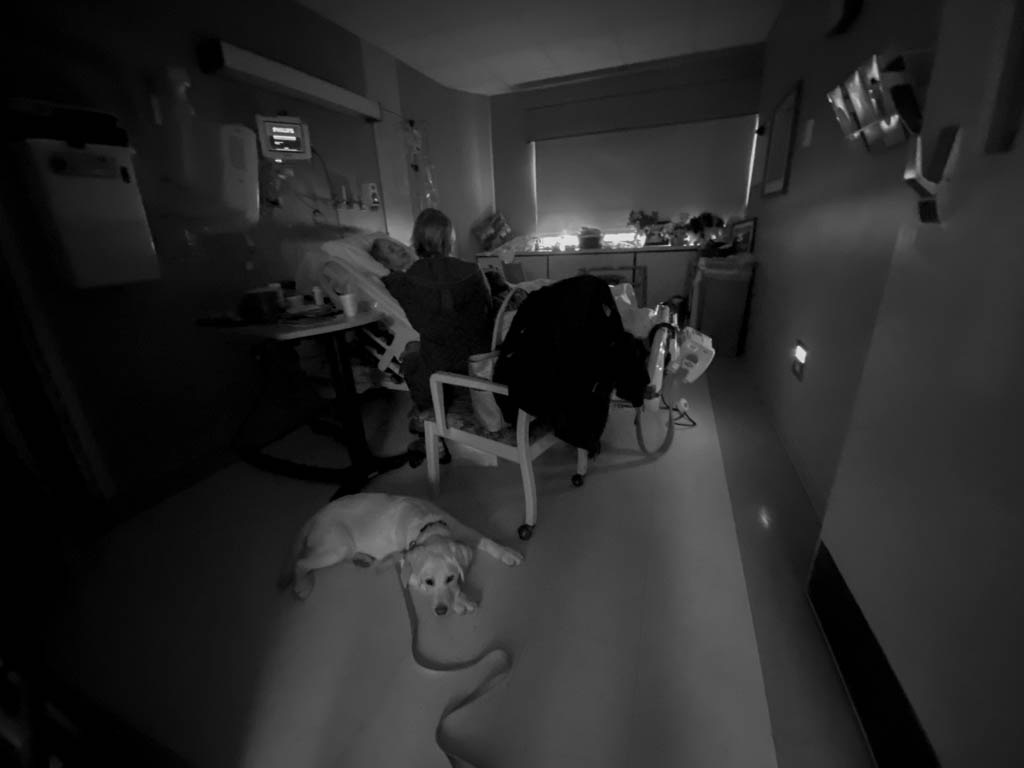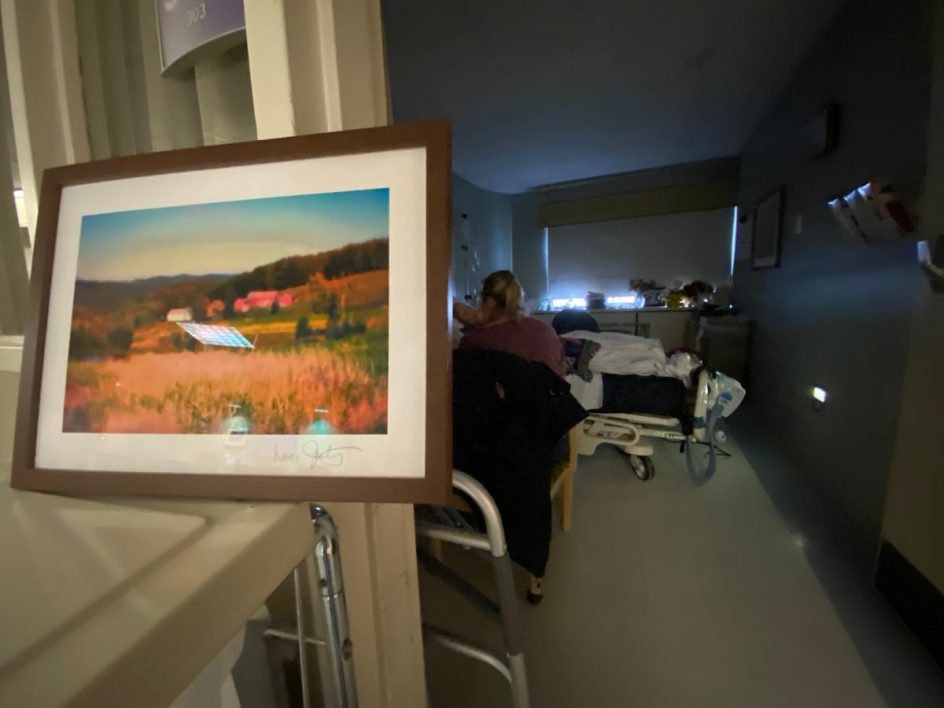Susan’s room is dark; the machines and lights turned off; the only sound is her deep breathing. It has become a moving spiritual space.
Her eyes are open; she no longer speaks and cannot stay awake.
I asked the doctors if I should come back to her room this evening and sat with her, and they nodded and said yes.
What is not said is often more meaningful than what is said.
Sometimes she mouths a word or
She has a smile on her face, interrupted by an occasional grimace or start. I have never seen her look so peaceful and at ease.
I am grateful to Susan for asking me to record the final days of her life. In a sense, it is one of the most creative tasks.
I am surprised sometimes to learn that people at the edge of life wish to be written about, photographed, noticed, their death recorded in the hope that other people might glean something from their own experience.
I admire the selflessness of this: a final gift, the gift of leaving the earth with some meaning. “Tell the truth,” she said. “It’s about time I learned to tell the truth..”
It is draining for me to do this, but not hard – I’ve written about a score of different deaths in my hospice and therapy work. It does help people; I hear from so many that they took something from it.
It is wonderful to bring Zinnia, a therapy dog from birth, right in the heart.
She is adept now at cheering up nurses and doctors, who need her as much as the patients. In just a few visits, she has a huge following in the hospital. We are signing up to do therapy work there.
She already grasps the atmosphere of a hospital room, the ethos of dying, of finding a quiet space to lie down and be still unless asked.
She only comforts, never intrudes. I tell her to lie down and drop the leash and focus on the people.
That is a remarkable gift for a young, active, and very social dog. I am thankful for her, especially on a day like today
I believe in openness, and openness at this time is a statement of strength and love.
Maria and I came to see Susan this morning, a co-worker from the Bennington Hospital lab, where Susan worked, was sitting with her. Her friends from work have been visiting her over the last week.
We brought two special pillows, her laptop, one of her photographs, and the picture I gave her two years ago; she asked that I bring it to her room. It is from a happier time; it is signed, “Love, Jon Katz,” and hung just inside the front door.
Susan loved Bedlam Farm, the sheep, the donkeys, the dogs, the feeling.
I don’t know if she could see the photograph.
I left Maria alone for a while so she could say her private goodbye to Susan, which she did. I’ll be back around dinner time myself; I have a feeling Susan ought to have some company this evening.
“Do you feel you have to go,” Maria asked in the car on the way home. “No,” I said,”I want to go.”
Susan’s friendship, illness, and death have been hard on Maria, and meaningful. She is writing about it herself today on her blog, as I write about it on mine.
Saratoga Hospital is wonderful, given the opportunity, I would be grateful for the chance to die there if I can’t die at home. The staff is caring, attentive, loving and sensitive.
Susan is at peace, hallelujah. I can see it in her face; she is letting go.
The hospital has seen to it that her final days are comfortable and dignified.
And so very quiet, even gentle in that room.
Susan has not had a peaceful life; she has a wickedly self-destructive and painful streak, which she never quite beat, even in sickness and death. In just a few weeks after she moved upstate, she was pulled over by the police a half dozen times for speeding.
Why?, I asked. “I like to speed,” she said.
She took lovely photographs, but once or twice posted the photographs of other people as hers, she just didn’t think she was good enough.
“Why?,” I asked. “I wanted people to like me,” she said.
She is one of those people who has no idea how bright and loving they are. Nobody ever told her.
I asked her why she allowed her self to get so sick all alone, and why not even her closest friends knew how ill she was or how much she was suffering alone in her house.
She shrugged and said, “you know me.”
In a sense, did, in a sense, I didn’t.
I’m not sure Susan ever got to know me either, beyond her notion of me as a celebrity. But in the past days, there was a real closeness, a real connection a real sense of friendship.
Friendship is like that, I think, sometimes it just has to find itself. We sure are close right now.
Death pushes the bullshit of people away.
Death is powerful in that way; we have no choice but to get real, or to run. And I am glad I didn’t run from her, as some others did.
Death always reminds me of the good and compassion in people, of the humanity that binds us together, despite all of our differences.
People who sit with the dying almost invariably say their friend or loved one hears them, knows they are there. Some people hold the hand of the dying; others rub lotion on the back of their hands. I usually read to them.
I honestly don’t know if Susan can hear me or understand me. I’m sure she can hear sounds and sense feelings. That’s good enough. She has better things to think about than me.
Her best friend Donna is hoping to get to the hospital by Tuesday, we both hope she makes it in time. Susan told me her friendship with Donna was as honest as anything in her life.
Today, I’m the point person, the doctors and nurses contact me if there is any change. I have a strong relationship with Susan’s brother Steve, who lives in California. He texted me as I was writing this.
The two have had difficulties, as Susan often had relating to people. “When she wakes up,” he asked, “please tell her that I love her, always have, always will.” He also asked if it was possible for me to play some music.
I can do that.
In a sense, this is the most meaningful part, being with someone you care about as they leave the world. We could not make Susan happy or help her heal from the wounds of life, but we could help her die in peace and comfort.
That will do. When it gets dark, I’ll head back to this sacred room, this spiritual space. If I can, I’ll write about it later when I get home.



Again, thank you. Thank you for reminding me what is most important in life. It’s our relationships. You say Susan’s room is a sacred space. As I have sat with dying family members and those I love, I too recognize that I am treading on sacred ground. Thank you. Thank you for your honesty and humanness.
Good to read this about this perspective of death and dying. Thank you Jon
Brings back a lot of memories, sitting by my sister, Marion’s, hospital bed from May 6, 2018 through July 7, then at home with her for a brief reprieve after brain surgery until July 11 when she had to re-admitted because her cancer had spread and left her unable to walk or see. The hospital, however, was, unfortunatley, a very horrendous experence because they had no intention of keeping my sister (or me as her primary care giver) comfortable…all they wanted was her bed to be vacated as soon as possible (even though they refused to declare my sister “palliative”!) so the next poor unsuspecting “patient” could occupy it. From that hospital I went with her in an ambulance to her final destination, Dorothy Ley Hospice, where it was much more comfortable and quieter and I was able to stay comfortably overnight by her side, and where she ultimately passed peacefully on August 18, 2018 at age 58. Too young!
Toronto Western Hospital administration put through over $6,800 charges on my VISA card, debt from which I will never recover. Their accounting deparment was rude, uncaring, and did not even send me an itemized bill or statement. I finally gave up calling them up demanding paperwork because I was so exhausted and beaten down mentally by this point. I personally would rather die like a dog on the street than suffer through that hospital’s so-called care! Obviously, I am still angry about that experience. We had many meetings with their staff doctors, nurses, social workers, LPNs, with our brother and another sister, plus her greatest advocate and former boss, David Lepofsy, a wonderful man who happens to be a blind lawyer, recently retired counsel for the Ontario Ministry of the Attorney General’s office. Even with all the supports around us, Marion still was taken too soon from us and the hospital staff did not care or listen. Two palliative care docs were on our side not to move Marion, but they got out-voted by the administration and regular medical team of doctors. When Toronto Western Hospital sent a Christmas ornament that year (and an appeal for donations) to our house I left it sealed and wrote on the back of the envelope: “RETURN TO SENDER: You are the ones who gave up on my sister and ultimately killed her! Here is your ornament back and take us OFF your mailing list”. Never heard from them again. Totally ludicrous request and invasion of our privacy.
I am so glad to hear that the Saratoga Hospital is such a wonderful, kind, caring, capable hospital with an obiously wonderful staff and community to boot! Keep up the good work Jon.
Thank you for your words, Jon.
Here is a poem by Mary Elizabeth Frey from 1932:
DO NOT STAND AT MY GRAVE AND WEEP
Do not stand at my grave and weep
I am not there; I do not sleep.
I am a thousand winds that blow,
I am the diamond glints on snow,
I am the sun on ripened grain,
I am the gentle autumn rain.
When you awaken in the morning’s hush,
I am the swift uplifting rush
of quiet birds in circled flight.
I am the soft stars that shine at night.
Do not stand at my grave and cry,
I am not there; I did not die.
Thank you. That is beautiful
I’ve been reading some of Susan’s blogs tonight. She had her sad times but also valued the good times, too. Seems she put her mind to appreciating what she could, when she was able. I wish her peace.
Susan is at peace…